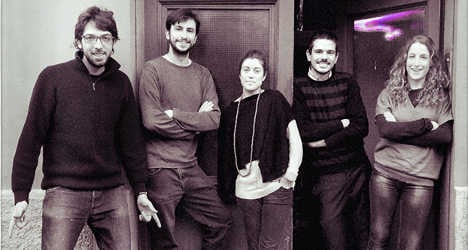Marzioni, 27, is part of a five-strong team behind Bulbo, a company which sells Italian-made lamps designed for home farming. This means urban dwellers can grow chillies in their kitchen and basil in their bathroom with style.
The idea won them the Spinner Global Grant, a prize for innovative technology co-funded by the EU, and the group has just returned from showcasing Bublo in London.
While the team has been awarded for their design efforts – which started back in 2010 as a technology project at the Polytechnic University of Milan – their success can also be a business model for other Italian startups.
“We are going through a tough period in Italy in which the market in most sectors is slowing down…normal work is difficult to find and the pay is very low," Marzioni tells The Local.
“When you are forced to find solutions on your own, it’s then that you come up with the right thing to do."
Bulbo was the brainchild of Lorenzo Antonioni, the 28-year-old who first designed the lamps while doing an internship at a lighting company. He then appealed to friends with different expertise, including economics graduate Marzioni, to turn the idea into a business.
Together they worked on a funding application, which they won in November 2012, before approaching a design company in Bologna to make the lamps.
From the outset the team were determined to create a ‘Made in Italy’ product. “One of the important aspects for European funding is to create new ideas which involve the greatest number of suppliers in country,” he explains.
“Italy has a lot of knowledge and know-how and we wanted to associate this with a new product and innovation.”
With winter fast approaching, the Bulbo team aims to brighten up darker countries in Europe. “The further north you go, the more useful Bulbo is because it’s associated with the land of winters and low light. So we have started focusing on the Nordic countries,” Marzioni says.
Looking beyond Italy is essential for business success, he adds: “Today it’s very important to expand internationally. We have all had experiences working or studying in other countries and live in a society formed of many cultures and ideas.”
Marzioni encourages other young Italians to do the same and look beyond the economic crisis, which has seen youth unemployment top 40 percent.
“You have to choose; take a risk when you don’t know where it’s going and do the best you can with good ideas,” he says.
People should also explore the numerous funding options; by winning a grant Bulbo not only gained vital financing but also credibility on the market. “Never think that without money you can’t do anything…there is always a way to come up with the solution,” Marzioni says.
Space for talent
Davide Dattoli, 22, has also spotted opportunity in Italy. Two years ago he created Talent Garden, a company that runs shared workspaces in seven cities across Italy.
While the concept may be the norm in New York or London, the idea is new to Italy. Dattoli came up with his own model, including appealing design features such as eco-friendly furniture and table football, and raised the capital from local businesses.
"The idea came from the need to have a stimulating space and to meet interesting people," Dattoli tells The Local. "Local businesses want us to help their area, to develop and improve it; they've helped us grow quickly."
From its origins in the northern city of Brescia, Talent Garden now boasts a team of 30 and 450 members who pay a monthly fee of €250 to access any of the workspaces. Members also benefit from Talent Garden operating around the clock, catering for a diverse range of careers.

Now well established in northern Italy, Dattoli has his sights set on the capital and beyond.
“We are still working and we will have more places open soon. We are looking to expand the network across Europe, the US – the world,” he says.
While the business is entirely different from that of the Bulbo team, both Dattoli and Marzioni attribute their success to their international approach.
"We are often in different places around the world to study similar models and make agreements. Today the market is global and we cannot only think of our own country; each business must get global," says Dattoli.
But for those not able to travel beyond Italy's borders, he adds that entrepreneurs can succeed by first focusing on a clear business plan.
"Always aim high," he adds.
Don't want to miss a story about Italy? – Then join The Local Italy on Facebook and Twitter.







 Please whitelist us to continue reading.
Please whitelist us to continue reading.
Member comments